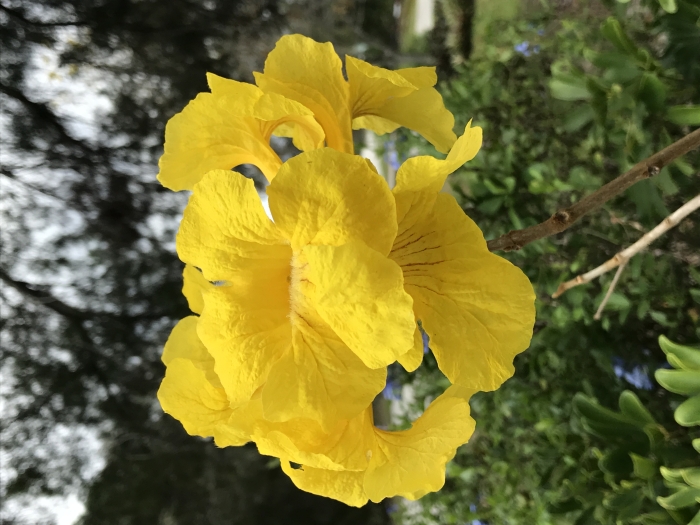Golden Trumpet Tree
(Handroanthus chrysotrichus)
Golden Trumpet Tree (Handroanthus chrysotrichus)
/
/

M.Aurelius
CC0
Image By:
M.Aurelius
Recorded By:
Copyright:
CC0
Copyright Notice:
Photo by: M.Aurelius | License Type: CC0 | License URL: http://creativecommons.org/publicdomain/zero/1.0/deed.en | Uploader: M.Aurelius | Publisher: Wikimedia Commons | Title: Golden_Trumpet_Tree.jpg | Notes: |

















Estimated Native Range
Summary
Handroanthus chrysotrichus, commonly known as Golden Trumpet Tree, is a semi-deciduous tree native to the Cerrado and Atlantic Forest biomes in Brazil. It typically grows to a height of 5 to 8 meters (15 to 25 feet), but can occasionally reach up to 20 meters (50 feet), with a canopy spread of 8 to 11 meters (25 to 35 feet). The tree is renowned for its striking, vibrant golden-yellow to red flowers that bloom in the spring, creating a spectacular display. These flowers are not only showy but also rich in nectar, making the tree a valuable resource for pollinators and a popular honey plant.
The Golden Trumpet Tree is appreciated for its ornamental value, particularly the springtime floral display, which can be a focal point in gardens. It is suitable for urban planting, as a specimen tree, and in mixed borders. This species is rated for USDA hardiness zones 9b through 11 and exhibits moderate drought tolerance once established. It thrives in full sun and requires soils with medium drainage. While it is relatively easy to maintain, it can be susceptible to root rot in poorly drained soils and may attract pests such as aphids and mealybugs. It is not typically invasive when grown outside its native range, but gardeners should always monitor and manage plants responsibly to prevent unwanted spread.CC BY-SA 4.0
The Golden Trumpet Tree is appreciated for its ornamental value, particularly the springtime floral display, which can be a focal point in gardens. It is suitable for urban planting, as a specimen tree, and in mixed borders. This species is rated for USDA hardiness zones 9b through 11 and exhibits moderate drought tolerance once established. It thrives in full sun and requires soils with medium drainage. While it is relatively easy to maintain, it can be susceptible to root rot in poorly drained soils and may attract pests such as aphids and mealybugs. It is not typically invasive when grown outside its native range, but gardeners should always monitor and manage plants responsibly to prevent unwanted spread.CC BY-SA 4.0
Plant Description
- Plant Type: Tree
- Height: 15-35 feet
- Width: 25-35 feet
- Growth Rate: Rapid
- Flower Color: Yellow
- Flowering Season: Spring, Winter
- Leaf Retention: Semi-Deciduous
Growth Requirements
- Sun: Full Sun
- Water: Medium
- Drainage: Medium
Common Uses
Bee Garden, Bird Garden, Butterfly Garden, Hummingbird Garden, Low Maintenance, Showy Flowers, Street Planting
Natural Habitat
native to the Cerrado and Atlantic Forest biomes in Brazil
Other Names
Common Names:
Scientific Names: , Tabebuia chrysotricha, Handroanthus chrysotrichus, Tecoma chrysotricha, Tecoma grandis, Tecoma chrysotricha var. obtusata, Tabebuia chrysotricha var. obtusata, Gelseminum chrysotrichum, Handroanthus chrysotrichus var. obtusata, Tecoma flavescens
GBIF Accepted Name: Handroanthus chrysotrichus (Mart. ex DC.) Mattos